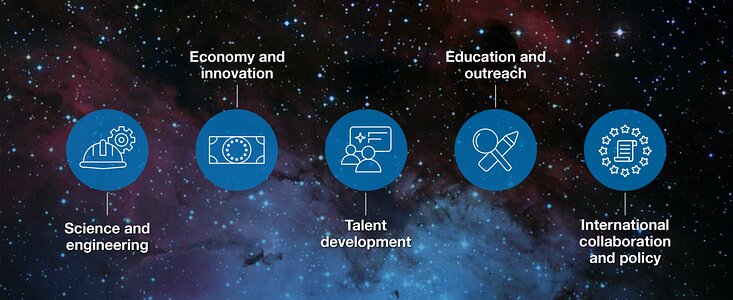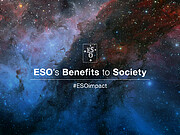Tiedote
Miten ESO vaikuttaa yhteiskuntaan? Uusi julkaisu korostaa ESO:n hyötyjä sen jäsenmailleen
22. tammikuuta 2021
Euroopan eteläinen observatorio (ESO) on Euroopan tutkimuksen, innovoinnin ja yhteistyön malliesimerkki, jolla on laaja-alainen ja merkittävä vaikutus koko yhteiskuntaan. Uudessa “ESO:n yhteiskuntahyödyt”- julkaisussa tarkastellaan ESO:n merkittävyyttä omille jäsenvaltioilleen viidellä eri alalla: tieteessä ja tekniikassa, taloudessa ja innovoinnissa, lahjakkuuksien kehittämisessä, koulutuksessa ja tiedotuksessa sekä kansainvälisessä yhteistyössä ja politiikassa.
Tieteen ja tekniikan alalla ESO ja sen kaukoputket ovat olleet hyvin merkittävässä asemassa useissa uraauurtavissa löydöissä. Esimerkiksi vuonna 2020 myönnettiin fysiikan Nobel-palkinto ESO:n teleskooppeilla tehdystä Linnunradan mustan aukon tutkimuksesta. ESO mahdollistaa tämänkaltaiset löydöt rakentamalla ja operoimalla maailman merkittävimpiä observatorioita, jotka siirtävät tekniikan rajoituksia kauemmas.
ESO:n mahdollistamat innovaatiot ulottuvat myös organisaation toiminnan ulkopuolelle. Esimerkiksi MUSE:ssa, eli ESO:n Very Large Telescope kaukoputken instrumentissa käytössä olevia tekniikoita sovelletaan lääketieteen ja syöpädiagnostiikan käyttöön. Tämän lisäksi ESO tuo taloudellista hyötyä yhteiskunnalle. Vuonna 2019 ESO:n budjetista 60 prosenttia investoitiin teleskooppien ja instrumenttien suunnitteluun ja rakentamiseen. Yli 90 prosenttia siitä investoitiin jäsenvaltioiden teollisuuden ja tutkimuslaitosten johtamiin korkean teknologian innovaatioihin.
ESO:lla on ollut ratkaiseva rooli erilaisten lahjakkuuksien kehittämisessä korkeasti koulutettujen tähtitieteilijöiden, insinöörien ja teknisten asiantuntijoiden opastamisen ja koulutuksen kautta. Pelkästään viimeisen 10 vuoden aikana ESO on kouluttanut yli 260 opiskelijaa yli 40 maasta luonnontieteiden ja tekniikan alalla. Tätä asiantuntemusta on sovellettu myös muilla teollisuuden ja julkisen elämän aloilla, kun ESO-alumnit jatkavat työuriaan koulutuksen, liiketoiminnan kehittämisen, ohjelma- ja projektinhallinnan sekä median ja viestinnän aloilla.
ESO:n viestintä-, koulutus- ja tiedotustoiminta ruokkii luontaista uteliaisuuttamme maailmankaikkeudesta ja lisää tieteen lukutaitoa yhteiskunnassa, sekä innostaa lapsia harrastamaan enemmän luonnontieteitä, teknologiaa, tekniikkaa ja matematiikkaa. Kymmenen viime vuoden aikana ESO on keskimäärin ollut esillä 46:ssa verkkoartikkelissa joka päivä. ESO:n Supernova Planetaario & vierailijakeskuksessa on vuodesta 2018 lähtien käynyt planetaarionäytöksissä 132000 kävijää ja opastetuilla kierroksilla 13000 kävijää.
Yhteistyö- ja kansainvälisenä organisaationa ESO pystyy saattamaan eri maita yhteen luodakseen tieteelliset ja poliittiset valmiudet eri kehitysprojekteihin, jotka eivät olisi mahdollisia yksittäisille jäsenvaltioille. ESO toimii siten tutkimuksen ja kehityksen roolimallina ja on eurooppalaisen tähtitieteen tutkimuksen kulmakivi.
Nämä kaikki ESO:n yhteiskunnalle antamat vaikutukset ovat hyvin nähtävissä kunnianhimoisen ja vallankumouksellisen Erittäin suuren teleskoopin (ELT) rakentamisessa. ELT on ESO:n tuleva lippulaivateleskooppi, jonka on määrä aloittaa toimintansa tällä vuosikymmenellä. ESO:n ELT tulee dramaattisesti muuttamaan tietoamme universumista ja se saa meidät ajattelemaan uudelleen omaa paikkaamme maailmankaikkeudessa.
”ESO on saanut aikaan kolme keskeistä hyötytekijää eurooppalaiselle ja globaalille yhteisölle: Ensinnäkin maailmanluokan observatorion, jonka ansiosta kansalliset tähtitieteen yhteisöt voivat toimia tehokkaasti observatorion mahdollistamien toimintojen ja instrumenttivaihtoehtojen toimesta, sekä se on mahdollistanut kansalliset hankkeet ESO:n sisällä; toiseksi se on tuonut laajan kokemuksen tähtitieteen megahankkeiden hallinnasta; ja kolmanneksi se on luonut vakaat puitteet, joiden ansiosta maat ovat pystyneet yhdistämään voimavarojaan näiden maailman merkittävimpien hankkeiden mahdollistamiseksi. ELT:n kaltainen projekti on Euroopassa mahdollinen vain ESO:n toimesta", nobelisti Didier Queloz sanoi.
"ESO:n yhteiskuntahyödyt"-julkaisu on nyt luettavissa verkossa.
Linkit
Yhteystiedot
Anna-Lynn Wegener
ESO Head of Communications
Garching bei München, Saksa
S-posti: Anna-Lynn.Wegener@eso.org
Tiedotteesta
| Tunnistus: | ann21002 |
Our use of Cookies
We use cookies that are essential for accessing our websites and using our services. We also use cookies to analyse, measure and improve our websites’ performance, to enable content sharing via social media and to display media content hosted on third-party platforms.
ESO Cookies Policy
The European Organisation for Astronomical Research in the Southern Hemisphere (ESO) is the pre-eminent intergovernmental science and technology organisation in astronomy. It carries out an ambitious programme focused on the design, construction and operation of powerful ground-based observing facilities for astronomy.
This Cookies Policy is intended to provide clarity by outlining the cookies used on the ESO public websites, their functions, the options you have for controlling them, and the ways you can contact us for additional details.
What are cookies?
Cookies are small pieces of data stored on your device by websites you visit. They serve various purposes, such as remembering login credentials and preferences and enhance your browsing experience.
Categories of cookies we use
Essential cookies (always active): These cookies are strictly necessary for the proper functioning of our website. Without these cookies, the website cannot operate correctly, and certain services, such as logging in or accessing secure areas, may not be available; because they are essential for the website’s operation, they cannot be disabled.
Functional Cookies: These cookies enhance your browsing experience by enabling additional features and personalization, such as remembering your preferences and settings. While not strictly necessary for the website to function, they improve usability and convenience; these cookies are only placed if you provide your consent.
Analytics cookies: These cookies collect information about how visitors interact with our website, such as which pages are visited most often and how users navigate the site. This data helps us improve website performance, optimize content, and enhance the user experience; these cookies are only placed if you provide your consent. We use the following analytics cookies.
Matomo Cookies:
This website uses Matomo (formerly Piwik), an open source software which enables the statistical analysis of website visits. Matomo uses cookies (text files) which are saved on your computer and which allow us to analyze how you use our website. The website user information generated by the cookies will only be saved on the servers of our IT Department. We use this information to analyze www.eso.org visits and to prepare reports on website activities. These data will not be disclosed to third parties.
On behalf of ESO, Matomo will use this information for the purpose of evaluating your use of the website, compiling reports on website activity and providing other services relating to website activity and internet usage.
Matomo cookies settings:
Additional Third-party cookies on ESO websites: some of our pages display content from external providers, e.g. YouTube.
Such third-party services are outside of ESO control and may, at any time, change their terms of service, use of cookies, etc.
YouTube: Some videos on the ESO website are embedded from ESO’s official YouTube channel. We have enabled YouTube’s privacy-enhanced mode, meaning that no cookies are set unless the user actively clicks on the video to play it. Additionally, in this mode, YouTube does not store any personally identifiable cookie data for embedded video playbacks. For more details, please refer to YouTube’s embedding videos information page.
Cookies can also be classified based on the following elements.
Regarding the domain, there are:
- First-party cookies, set by the website you are currently visiting. They are stored by the same domain that you are browsing and are used to enhance your experience on that site;
- Third-party cookies, set by a domain other than the one you are currently visiting.
As for their duration, cookies can be:
- Browser-session cookies, which are deleted when the user closes the browser;
- Stored cookies, which stay on the user's device for a predetermined period of time.
How to manage cookies
Cookie settings: You can modify your cookie choices for the ESO webpages at any time by clicking on the link Cookie settings at the bottom of any page.
In your browser: If you wish to delete cookies or instruct your browser to delete or block cookies by default, please visit the help pages of your browser:
Please be aware that if you delete or decline cookies, certain functionalities of our website may be not be available and your browsing experience may be affected.
You can set most browsers to prevent any cookies being placed on your device, but you may then have to manually adjust some preferences every time you visit a site/page. And some services and functionalities may not work properly at all (e.g. profile logging-in, shop check out).
Updates to the ESO Cookies Policy
The ESO Cookies Policy may be subject to future updates, which will be made available on this page.
Additional information
For any queries related to cookies, please contact: pdprATesoDOTorg.
As ESO public webpages are managed by our Department of Communication, your questions will be dealt with the support of the said Department.


